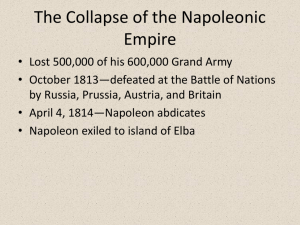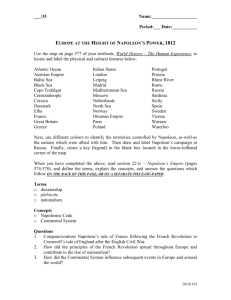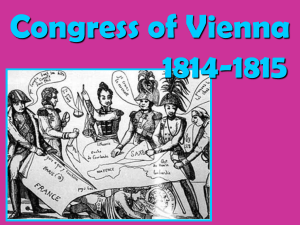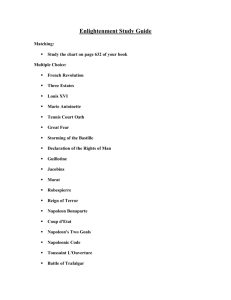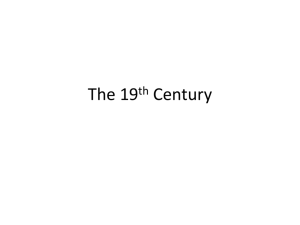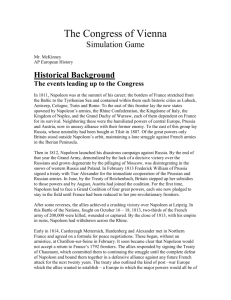French Revolution, Napoleon, and Congress of Vienna
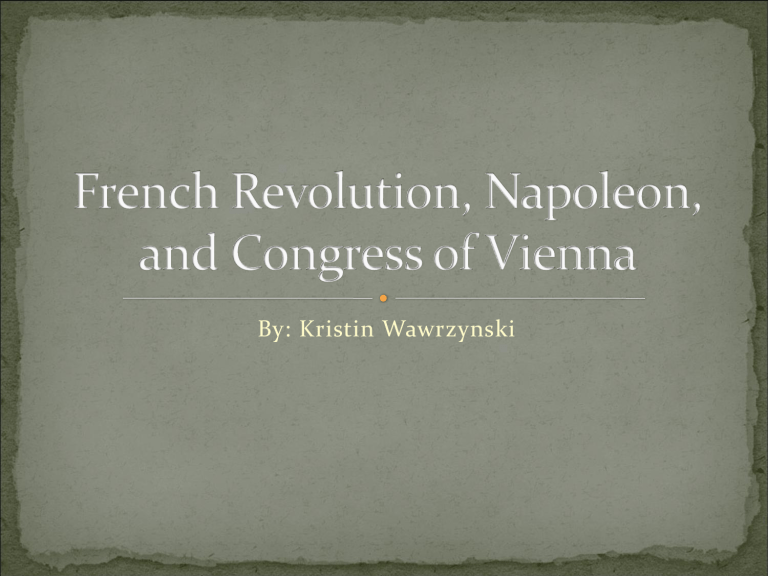
By: Kristin Wawrzynski
CAUSE:
National debt and the annual budget deficit soared*
France was split into 3 Estates:
Clergy- owned about 10% of land and only paid “voluntary gifts” to the government every 5 years*.
Nobility- owned about 25% of land and taxed very lightly.
They enjoyed many manorial rights* that allowed them to tax the peasantry
Everyone else- some were educated merchants, lawyers and officials, but majority were urban artisans and unskilled day laborers (peasants and countryside agricultural workers)
1789-Estates General convene at Versailles
Third Estate declared itself the “National Assembly” and swore the famous Oath of the Tennis Court?*
Storming of the Bastille for weapons and gunpowder
The Great Fear- fear of vagabonds and outlaws- fanned the flames of rebellion
Declaration of the Rights of Man declared
National Assembly confiscates church lands
1791- Royal family is arrested during an attempt to flee
France
1792- France declares war on Austria
Louis XVI is taken prisoner of Russian mob
September Massacre (second revolution)
National Convention declares France a republic and abolishes monarchy
***Rein of Terror (1793-1794)- used revolutionary terror to solidify the homefront
Generally it
Strengthened the belief that France foolishly replaced a weak king with a bloody dictator
Was used to gain the goal for an ideal democratic republic*
1795-1799-
Directory rules
Napoleon Bonaparte (1769-1821)-realized the need to put an end to civil strife in France in order to create unity and consolidate his rule
November of 1799- he was named first consul of the republic
Concordat of 1801- Signed by both Napoleon and Pope
Pius VII
Pope gained, for French Catholics, the right to practice their religion freely
Napoleon gained political power*
Family monarchy- re-established
Free speech and press was violated
1800- Napoleon funds the Bank of France
1801- Treaty of Luneville- Austria accepted the loss of almost all its Italian possessions and German territory on the west bank of the Rhine
Treaty of Aimes- with Great Britain- France remained in control of Holland, the Austria
Netherlands, the West banks of the
Rhines, and most of the Italian peninsula
1804- Crowns himself emperor
1805- Battle of Trafalgar, Battle of Austerlitz
1807- redrew the map of Germany; to weaken Austria and restrict trade with Britain
1812- invades Russia with 600,000 men but disastrously retreats
1814- (Treaty of Chaumont) Quadruple Alliance is formed to defeat France
Napoleon abdicated and is exiled to Elba
Escapes from Elba and ruled France until defeat at Battle of
Waterloo
Goals:
1. Establish a new balance of power in Europe to prevent imperialism and maintain peace
2. Prevent political revolutions “maintain status quo”
3. Reconstruct the map of Europe
Quadruple
Alliance*:
Austria. Britain,
Prussia, and
Russia
Host of delegates from smaller states
Low
Countries:
Belgium and
Holland were united under an enlarged
Dutch monarchy to be more effective
Started after Napoleon surrendered to the allied powers of Europe in Paris
1 st Treaty of Paris (signed in 1814) gave France its boundaries from 1792, and France didn’t have to pay any war reparations.
Established Compensation:
Prussia: Part of Saxony, Grand Duchy of Berg, and part of the Duchy of Westphalia
Russia: Grand Duchy of Warsaw (made into a separate kingdom of Poland), Finland, and Bessarabia
Austria: Received Venetia, Lombardy, and Milan in
Italy; Galicia in Poland; and Tyrol and Salzburg in
Germany
The German States: a German Confederacy was set up to replace the Old Holy Roman Empire
Etc.
1815, Napoleon landed in Southern France with an army of 1000 men in the hopes of surprising the allies and regaining control of France
The representatives (still in Vienna) stopped fighting over the land boundaries and banded together to form a powerful army.
Final act of the Congress of Vienna
(1815): ended the meeting with a plan for
Balance of power
A reconstructed Europe
Plan to meet periodically**
http://wps.ablongman.com/long_kishlansky_cw_5/0,6472,
269723-,00.html
http://www2.sunysuffolk.edu/westn/congvienna.html
http://ibatpv.org/projects/congress/vientime.html
http://www.victorianweb.org/history/forpol/vienna.html
Textbook
